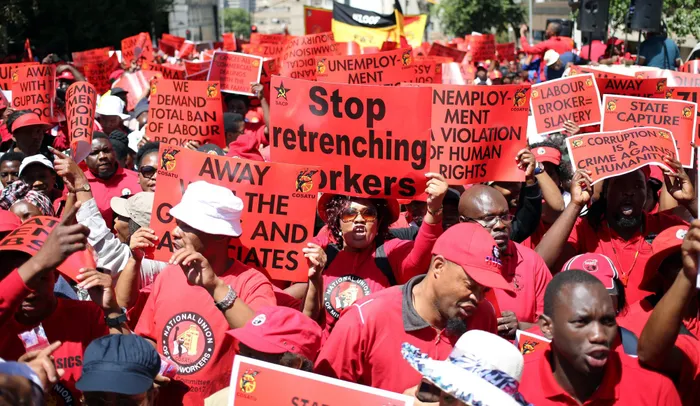South Africa loses 80,000 jobs in Q2 2025: SAFTU condemns 'structural crisis'

South Africa's 'Neoliberal Job Crisis': SAFTU raises alarm over alarming Q2 Employment data.
Image: Mike Hutchings
The South African Federation of Trade Unions (SAFTU) expressed "deep alarm" over Statistics South Africa's latest Quarterly Employment Statistics (QES) for the second quarter of 2025, which revealed a continued deterioration in employment levels across key sectors.
The QES report showed a troubling decline of 80,000 jobs from March to June 2025, bringing total employment figures down from 10.59 million to just over 10.5 million workers.
The job losses were most severe in community services, with 53,000 fewer jobs, followed by trade (10,000), manufacturing (9,000), construction (7,000), transport (2,000), and business services (2,000).
Although the mining and electricity sectors recorded slight gains of 2,000 and 1,000 jobs, respectively, these increases pale compared to the 229,000 jobs lost year-on-year between June 2024 and June 2025.
Full-time employment decreased by 55,000 jobs quarter-on-quarter, while part-time employment declined by 36,000.
There are now more than 8.4 million unemployed South Africans, with nearly half of the working-age population excluded from meaningful employment.
In a statement released on Wednesday, SAFTU General Secretary Zwelinzima Vavi criticised South Africa’s ongoing structural jobs crisis.
"These grim figures confirm once again that South Africa remains trapped in a structural jobs crisis, a crisis born of neoliberal austerity, deindustrialisation, and elite enrichment at the expense of the working class."
The union pointed to more profound economic failings behind the statistics, blaming decades of neoliberal policies favouring market liberalisation and foreign investment over job creation and industrial development.
“Since the adoption of GEAR in 1996, the promise that market liberalisation and foreign direct investment would create jobs has proven to be a cruel lie,” the statement reads.
SAFTU highlighted economic indicators showing that the Private sector fixed investment contributes only 10.8% of GDP, while the Public sector investment contributes just 4.3%.
It stated that Combined Gross Fixed Capital Formation remains stuck at 15% of GDP — half of the 30% needed to stimulate inclusive growth. GDP growth was a sluggish 0.8% in Q1 2025, narrowly avoiding a recession. Manufacturing capacity utilisation stagnates at 77–79%, meaning nearly a quarter of productive capacity remains idle.
“This is not a problem of lazy workers but of disinvestment, load-shedding, collapsing rail and ports, cheap imports, and the absence of any coherent re-industrialisation strategy,” said National Spokesperson Newton Masuku.
SAFTU warned of the growing social consequences of this failed economic model, including mass unemployment and poverty, extreme inequality, collapsing public services, rising crime and gender-based violence, and widespread youth hopelessness.
The union described the current Government of National Unity’s response as entrenched in the neoliberal policies that have failed South Africans for nearly thirty years.
The union singled out initiatives like Operation Vulindlela and ongoing austerity measures as deepening the crisis rather than resolving it, calling instead for a fundamental shift towards "redistribution, social ownership, and democratic control of the economy."
SAFTU’s demands include ending austerity and neoliberal policies that "strangle growth and jobs" and launching a mass public investment programme to rebuild infrastructure and public services and re-industrialise the economy.
In addition, suggested the Implementing of a democratic public works programme guarantees jobs with decent wages and conditions, and leverages idle manufacturing capacity with an industrial strategy focused on localisation, beneficiation, and import substitution.
SAFTU demanded urgent steps to halt the investment strike from private capital and state segments and build a new economic model anchored in worker control and wealth redistribution.
“These statistics are not just numbers; they are the lived reality of millions of families going to bed hungry, communities torn apart, and young people denied a future.”
“The working class cannot continue to pay the price for a system designed to enrich the few. We must build a new economy that puts people before profit,” read the statement.
thabo.makwakwa@inl.co.za
IOL Politics
Get your news on the go. Download the latest IOL App for Android and IOS now.
Related Topics: